2022届高考英语二轮复习:状语从句课件(62张)
文档属性
| 名称 | 2022届高考英语二轮复习:状语从句课件(62张) |  | |
| 格式 | pptx | ||
| 文件大小 | 1.5MB | ||
| 资源类型 | 教案 | ||
| 版本资源 | 通用版 | ||
| 科目 | 英语 | ||
| 更新时间 | 2022-01-09 09:31:03 | ||
图片预览



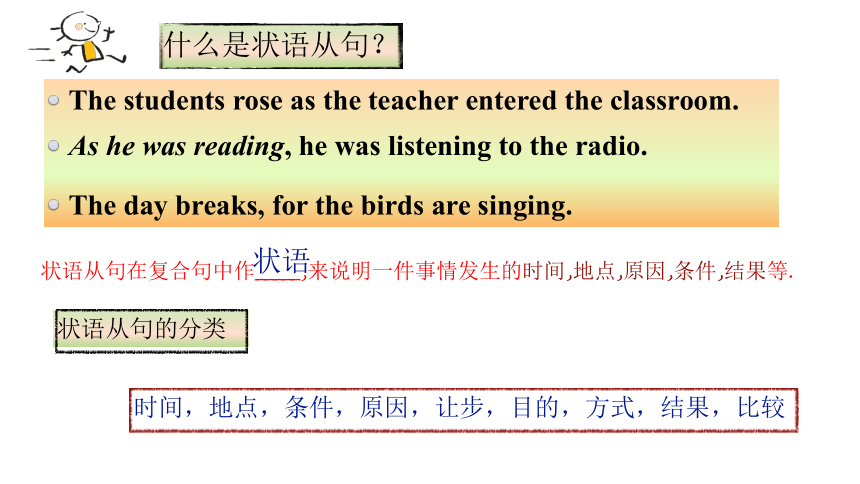
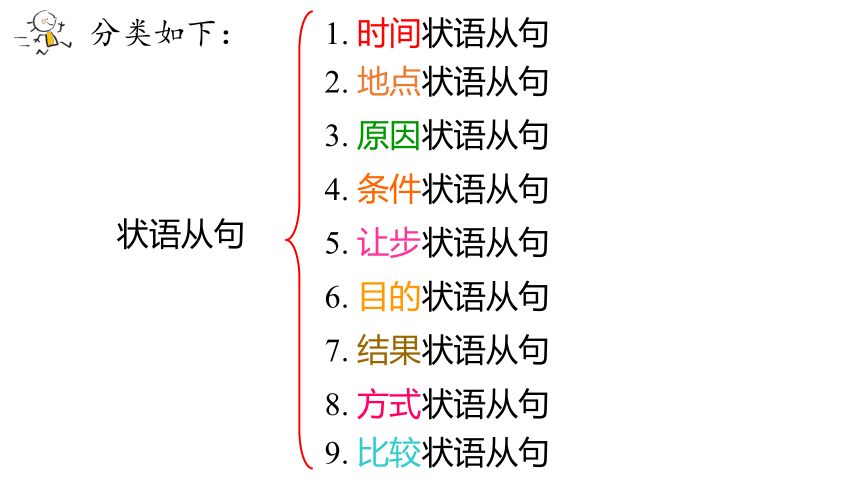

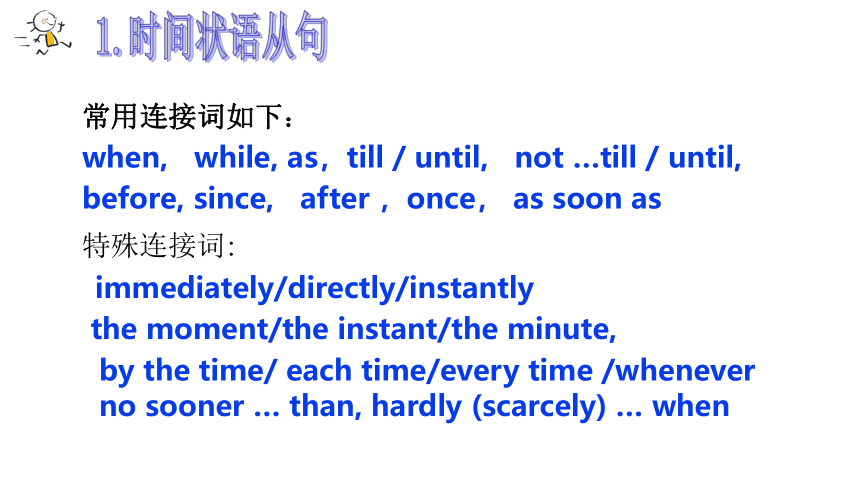
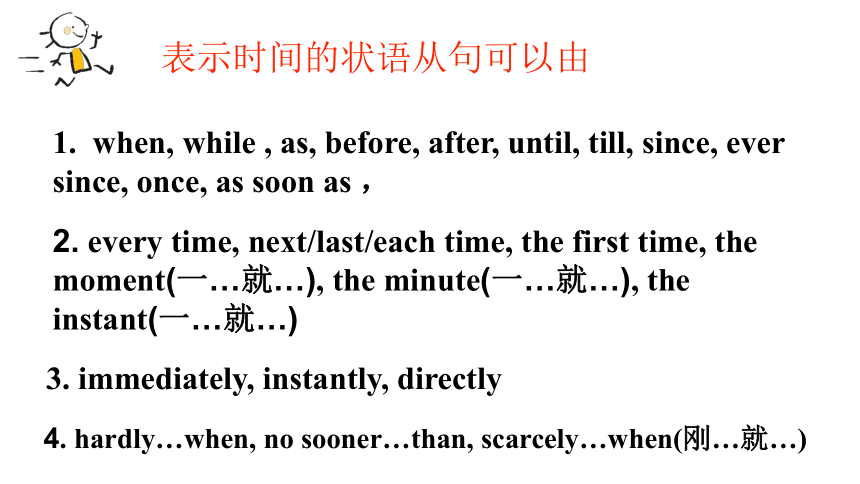
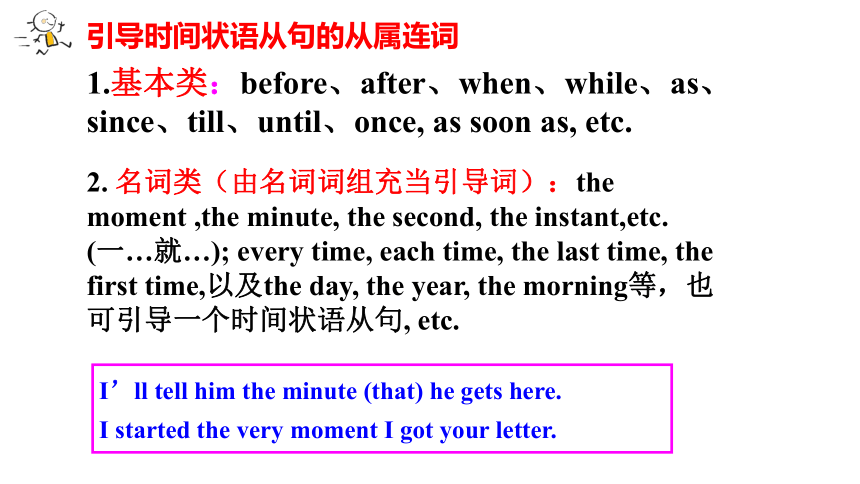
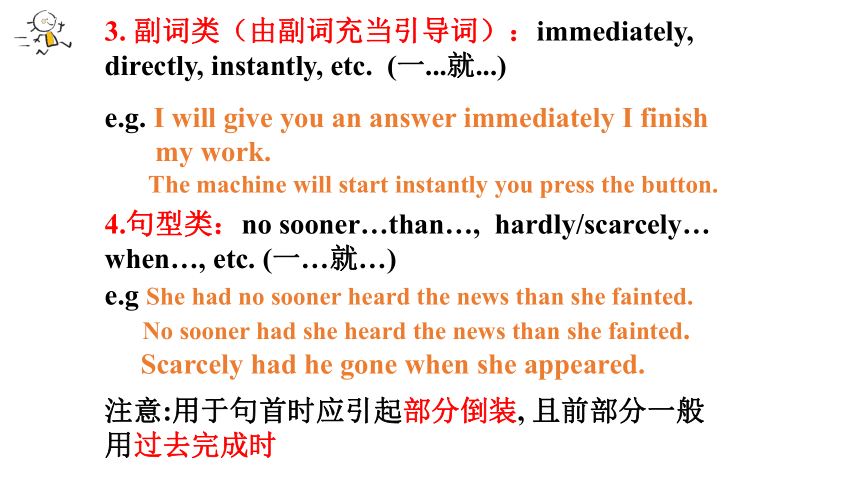
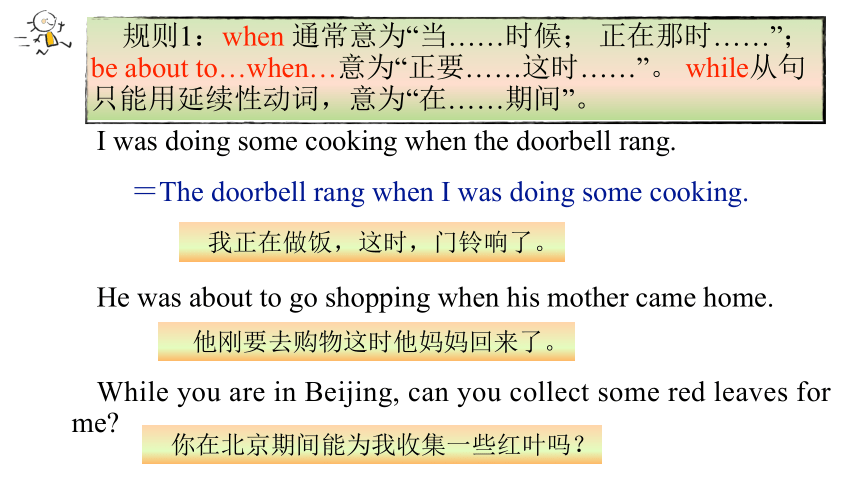
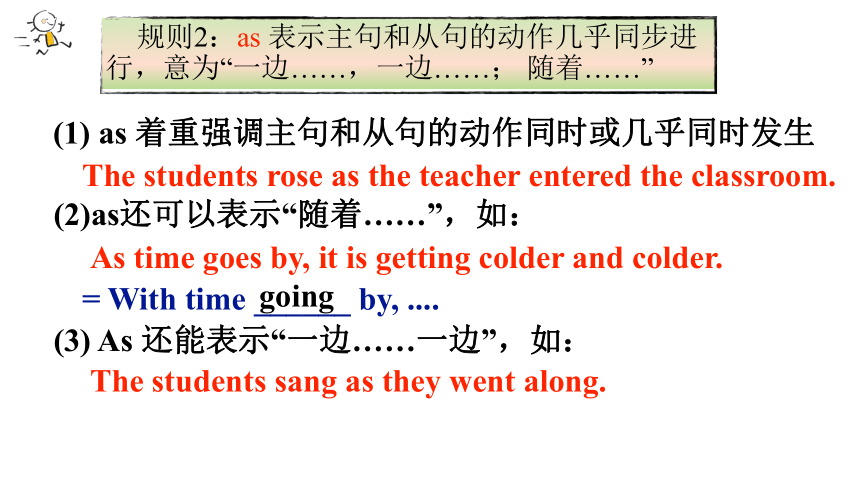
文档简介
(共62张PPT)
状语从句
目录
01状语的概念与种类
02状语从句的引导词
03状语从句的省略
状语的概念与种类
01
什么是状语从句?
The students rose as the teacher entered the classroom.
As he was reading, he was listening to the radio.
The day breaks, for the birds are singing.
状语从句在复合句中作_____,来说明一件事情发生的时间,地点,原因,条件,结果等.
状语
状语从句的分类
时间,地点,条件,原因,让步,目的,方式,结果,比较
分类如下:
状语从句
1. 时间状语从句
2. 地点状语从句
3. 原因状语从句
4. 条件状语从句
5. 让步状语从句
6. 目的状语从句
7. 结果状语从句
8. 方式状语从句
9. 比较状语从句
状语从句的引导词
02
1.时间状语从句
常用连接词如下:
when, while, as,till / until, not …till / until, before, since, after ,once, as soon as
特殊连接词:
immediately/directly/instantly
the moment/the instant/the minute,
by the time/ each time/every time /whenever
no sooner … than, hardly (scarcely) … when
1. when, while , as, before, after, until, till, since, ever since, once, as soon as ,
2. every time, next/last/each time, the first time, the moment(一…就…), the minute(一…就…), the instant(一…就…)
3. immediately, instantly, directly
表示时间的状语从句可以由
4. hardly…when, no sooner…than, scarcely…when(刚…就…)
引导时间状语从句的从属连词
1.基本类:before、after、when、while、as、since、till、until、once, as soon as, etc.
2. 名词类(由名词词组充当引导词):the moment ,the minute, the second, the instant,etc. (一…就…); every time, each time, the last time, the first time,以及the day, the year, the morning等,也可引导一个时间状语从句, etc.
I’ll tell him the minute (that) he gets here.
I started the very moment I got your letter.
3. 副词类(由副词充当引导词):immediately, directly, instantly, etc. (一...就...)
4.句型类:no sooner…than…, hardly/scarcely… when…, etc. (一…就…)
e.g. I will give you an answer immediately I finish
my work.
The machine will start instantly you press the button.
e.g She had no sooner heard the news than she fainted.
No sooner had she heard the news than she fainted.
Scarcely had he gone when she appeared.
注意:用于句首时应引起部分倒装, 且前部分一般用过去完成时
I was doing some cooking when the doorbell rang.
He was about to go shopping when his mother came home.
While you are in Beijing, can you collect some red leaves for me
规则1:when 通常意为“当……时候; 正在那时……”;be about to…when…意为“正要……这时……”。 while从句只能用延续性动词,意为“在……期间”。
我正在做饭,这时,门铃响了。
你在北京期间能为我收集一些红叶吗?
=The doorbell rang when I was doing some cooking.
他刚要去购物这时他妈妈回来了。
The students rose as the teacher entered the classroom.
As time goes by, it is getting colder and colder.
= With time ______ by, ....
The students sang as they went along.
规则2:as 表示主句和从句的动作几乎同步进行,意为“一边……,一边……; 随着……”
(1) as 着重强调主句和从句的动作同时或几乎同时发生
(2)as还可以表示“随着……”,如:
(3) As 还能表示“一边……一边”,如:
going
规则3:如果主句表示的是短暂动作,而从句用延续性动
作的进行时态表示在一段时间内正在进行的动作时,when, while与as 可互换使用。
(一):when, while, as
_______________ we were talking, Mr. Smiths came in.
_____ they came home, I was cooking dinner.
I was about to go to bed _______ I heard someone knock at the door.
4. ________ we were watching TV, he was studying.
5. He is fat _______ his brother is thin.
6. ______ she sang, tears ran down her face.
While/ As/ When
When
when
While
while
As/When
as引导的时间状语从句, 可以表达“正当……”, “一 边……一边……”,“随着……”等意思。
1. 表示某事一发生,另一事立即发生。
As the sun rose, the fog disappeared.
2. 表示在某事发生的过程中,另一事发生。
Just as he was speaking there was a loud explosion.
3. 表示两个动作同时发生。
Helen sang a song as she washed.
4. 表示“随着…..”.常指一个行为是另一个行为的结果,或一种状态随另一种状态变化。句中的动词多表示状态的发展变化。As she grew older, she became more beautiful.
as, while , when的区别
while:持续性动词 /进行时
*一般或现在情况
*将来情况-V一般现在时或现在进行时
*过去情况
e.g. I like listening to music while I am doing
my homework.
e.g.— I’m going to the post office.
-- While you are there, can you get some
stamps for me
e.g. I hurt my should while I was doing gym.
While I was walking down the street, I came across an old friend. ( while=_______)
While I really don’t like art, I find his work impressive. ( while =_________ )
While there is life there is hope.
(while = __________ )
He likes pop music, while I am fond of folk music.
when
although
as long as
While 在句中的不同含义:
when: 持续性/非持续性动词都可
*当……时
*正在……忽然
e.g. When I first saw her, I fell in love with her.
---When did you get home
---It was eight o’clock when I got home.
They were walking down the street when they saw an accident.
2) I was about to go swimming when our guide stopped me.
*尽管/虽然/鉴于/如果/届时/
e.g. He walks when he might take a taxi.
The Queen will visit the town in May, when
she will open the new hospital.
How can you hope for mercy yourself when
you show none
How could I live in Los Angeles when all my
favorite people live here
虽然
届时
如果
鉴于, 既然
when 还有一些较为灵活的翻译:
主将从现
主祈从现
主过从过
when、while、as引导的时间状语从句
主句是一般将来时,从句用一般现在时---主将从现
Eg:When he arrives, I will call you.
主句是祈使句,从句用一般现在时---主祈从现
Eg:Please call me when he arrives in Beijing.
主句是过去的时态,从句用过去的时态---主过从过
Eg:She was sleeping while I was reading books.
before,after,since
He had left the town the day ______ she arrived.
It was not long ______ he left his hometown.
I played football _____ I (had) finished my homework
Please tell her I’ll come _______ I do some shopping.
5. It will not be long ______ we meet each other again.
6. I __________ (be) at his bedside since he _______ (become) ill.
7. It ____________ (be) two years since we _______ (begin) to use this machine.
before
after
before
after
before
have been
became
is/ has been
began
before引导的时间状语从句
◆ before引导的时间状语从句,常译为“在……之前”,
表示主句的动作发生在从句的动作之前。
We clean the classroom before we leave school every day.
It will not be long before you regret for what you’ve done.
不久你就会为你的所作所为后悔的。
after引导的时间状语从句
◆ after引导的时间状语从句,常译为“在……之后”,
表示主句的动作发生在从句的动作之后。
After you use plastic bags, you mustn’t throw them about.
用过了塑料袋之后,不准到处乱扔。
1)
It will be two years before he leaves the country.
2)
It was three weeks before he came back.
3)
It won’t be long before she comes back.
4)
It wasn’t long before he left the country.
“要过两年他才会离开这个国家”
“过了三周他才回来”
“要不了多久她就会回来的”
“没过多久他就离开这个国家了”
It is …before… 结构
从句和主句的时态: 1. 一致:过去式 2.主将从现
It will be two years before he leaves the country.
It was not long before he worked out the problem.
规则4
1)句型It will be/was+一段时间+before… “还要过多久才……”
2)句型It will be/was not+一段时间+before… “不多久就……”
a. It is three years since she joined the army.
b. It is four years since she smoked.
3)句型It be+一段时间+since… ,该句型主句和从句中动词谓语时态的搭配很严格。
It is/has been … since sb. did sth.
从句动词为短暂性动词
从句谓语动词为延续性动词
did肯定翻
did否定翻
since引导的时间状语从句
◆ since引导的时间状语从句,常译为“自从……”,
主句常用现在完成时,从句常用一般过去时。
例句翻译:我们自从分手以后一直没见过面。
We haven’t seen each other since we parted.
常用句型:It has been (is) + 时间段 + since从句
“自从……有多长时间了 ”
例句翻译:自从她大学毕业已经有六年时间了。
It has been (is) six years since she graduated from the university.
I slept until the clock alarmed.
I didn't sleep until my father came back.
我一直睡到闹钟响为止。
直到爸爸回来我才睡觉。
规则5:until在肯定句中,表示“到……为止”;在否定句中,常与not连用,表示“直到……才开始”。
until/ till引导的时间状语从句
◆ until / till 引导的时间状语从句,常译为“直到……时”,
表示主句动作发生在从句之前。
◆当主句谓语动词是延续性动词时,主句常用肯定形式。
例句:我会待在这里,直到你回来。
I’ll stay here until you come back.
◆当主句谓语动词是非延续性动词时, 主句常用否定形式。
not… until…“直到……才……”,这时until 可用before替换。
He didn’t go to bed until he finished his homework.
例句:他直到做完作业才睡觉。
The moment I heard the voice,I knew my father was coming.
The boy burst into tears immediately he saw his mother.
我一听到那个声音就知道我爸爸来了。
那男孩一见到他的妈妈便放声大哭。
规则6:as soon as, immediately, directly, instantly, the moment, the minute, the instant等,常译为“一……就……”。
as soon as引导的时间状语从句
◆ as soon as 引导的时间状语从句,译为“一…就…”,
表示从句动作一发生,主句的动作马上就发生。
例句:他一回来我就告诉他这件事。
I will tell him about it as soon as he comes back.
◆相当于as soon as 用法的词或短语还有:immediately,
directly, instantly, the moment, the minute, the instant等.
I’ll give him your message the minute he arrives.
Directly I had done it, I knew I had made a mistake.
No sooner had he sat down than the phone rang.
Hardly had the game begun when it started to rain.
他刚坐下,电话铃就响了。
比赛刚刚开始,天就开始下起雨来。
规则7:sooner…than 和hardly…when/before引导的从句表示“刚……就……”。主句中的动词一般用过去完成时,从句用过去时。若把no sooner, hardly提到句首,主句需要倒装。
3、We had _______________returned home when it rained.
4、_______________ had we begun when we told to stop.
hardly/scarcely
Hardly/ Scarcely
其他连词引导的时间状语从句
◆ no sooner… than…, hardly/ scarcely/ barely…when…引导
时间状语从句,从句用一般过去时,主句用过去完成时。
当no sooner, hardly/ scarcely/ barely位于句首时,主句要
用部分倒装。
I had no sooner begun to talk than he rang off.
No sooner had I begun to talk than he rang off.
我还未来得及讲话,他就挂断了电话。
Every time I see the film, I can't help recalling my childhood in the countryside.
Call me earlier next time you come to Shanghai.
每次看那部电影时,我就忍不住回想起自己在农村度过的童年。
你下次来上海时再早点儿给我打电话。
规则8:特殊的时间状语从句的连词有:every time 每当,每 次;the first time 第一次……的时候;next time 下次……时。如:
名词短语引导的时间状语从句
◆ the moment, the minute, the instant, the time, the hour, the
day, by the time, each time, every time, next time, any time等
也可以引导时间状语从句。
I thought her nice and honest the first time I saw her.
By the time you arrived, the lecture had already ended.
By the time he comes, we will already have left.
1. When every time I was in trouble, he would come to help me.
2. At next time you come, do remember bring your son here.
3. For the first time I met the girl. I felt in love with her.
4. You are welcome to come back at any time you want to.
5. At the last time she saw James, he was lying in bed.
语法规则:
every time,each time,next time,the first time,any time 等名词短语引导状语从句不加介词。
考点:名词短语引导时间状语从句
地点状语从句用连接副词 where或wherever (在任何地方) 引导。
e.g. a. Just stay where you are.
b. Where there is a will, there is a way.
c. You can sit wherever you like.
d. Wherever you go, I’ll be right here waiting for you.
When he reads a book, his habit is to make a mark ___ the meaning is unclear to him.
A. there B. wherever C. the place D. in which
2. 地点状语从句
原因状语从句表示主句中的某一动作或状态所发生的原因。引导这种从句 常用的连接词是:because, as, since, now that, for,和considering that, seeing that 这七个连词都用于表示表示原因, 但在语气上一个比一个弱。
e.g. He didn’t come to school because he was ill.
c.f. He might be ill, for he didn’t come to school.
表示“直接”原因。
表示“间接的推断”原因.
不可出现在句首。
3. 原因状语从句
because, since, as, for的区别:
because—直接原因,非推断.语气最强. 回答why的问题。
since – 通常放句首.译为“既然”
as– 不谈自明的原因,语气最弱。
for– 放句中,引导后半句表原因, 或补充推断的理由。
1. I danced in front of the people _________ I liked it.
2. You’d better wear strong shoes _____ we’ll do
a lot of walking.
3. ____ he was not well, I decided to go without him.
4. ______ everybody know about it, I don’t want to
talk any more.
5. He must be ill, ____ he is absent Today.
6. Some people believe that ______ oil is running out,
the fate of the motor industry is uncertain.
because
as
As
Since
for
since
条件状语从句表示主句中的某一动作或状态是在什么情况或条件下发生的。条件状语从句中通常用一般现在时表示将来。
条件状语从句由从属连词引导:if, unless (除非), as / so long as (只要), on condition (只要), once ( 一旦), in case (假使) , providing / provided (that) 等。
a.We’ll come over to see you on Saturday if we have time.
b. We should serve the people as / so long as we live.
4. 条件状语从句
____ you touch an English person, you should say “sorry”.
_____ they are dirty, certain seas are not able to clean themselves.
__________ we don’t lose heart, we’ll find a way to overcome the difficulty.
You can be allowed to play the game ___________
you finish your homework first.
Don’t touch anything ______ your teacher tells you to.
If
Once
As long as
on condition that
unless
在复合句中表示让步概念的状语从句被称为让步状语
从句。常用引导词:though, although, even if, even though,
no matter + 疑问词(what/ who/ where/ when/ which/ how)
疑问词-ever
(whatever, whoever, wherever, whenever, however, whichever)
特殊引导词: as (用在让步状语从句中必须要倒装),
while ( 一般用在句首 ),
whether… or… , whether (…) or not
5. 让步状语从句
though, although
◆ 判断以下句子是否正确:
Although he is rich, but he is not happy.
Although he is rich, yet he is not happy.
Although we have grown up, our parents still treat us as children.
◆要点归纳:
though, although当“虽然”讲, 都不能和 but 连用.
但是他们都可以同yet (still) 连用.
ever if, even though
even if 和 even though 表示“ ”
即使
We’ll make a trip even though the weather is bad.
as引导让步状语从句
as 引导的让步状语从句,必须将从句中的 、 、
以及谓语中的 提前至从句句首,作表语的单数
可数名词前如有冠词,冠词需 。
表语
状语
实意动词
省略
Though he works hard, he makes little progress.
Hard as/though he works, he makes little progress.
Though he was a child, he knew what was the right thing to do.
Child as/though he was, he knew what was the right thing to do.
Though you may object, I’ll go.
Object as you may, I’ll go.
whether… or… , whether (…) or not
whether… or… , whether … or not 表示“不论是否……”,
“不管是……还是……”。其引导的从句旨在说明正反两
方面的可能性都不会影响主句的意向或结果。
Whether you believe it or not, it is true.
You’ll have to attend the party whether you are free or busy.
while 也可以引导让步状语从句,意为“尽管”,语气比
though/ although弱。其引导的从句一般位于 。
句首
例句:我尽管喜欢它的颜色,但不喜欢它的形状。
While I like its color, I don’t like its shape.
no matter + 疑问词 疑问词-ever
No matter what happened, he would not mind.
Whatever happened, he would not mind.
替换:no matter what = whatever
no matter who = whoever
no matter when = whenever
no matter where = wherever
no matter which = whichever
no matter how = however
判断正误:
No matter what you say is of no use now.
Whatever you say is of no use now.
归纳:
no matter+疑问词不能引导主语从句和宾语从句,而 “疑问词+ever”则可以
引导目的状语从句的连词:
in order that …
用于正式文体中,所引从句可于主句前或后。
so that
a. 较常用,一般用于主句后,有时可分开,so 有时可省; 从句中要有情态动词, 否则, 就成为下一种句型:
b. 无情态动词则引导结果状语从句。
for fear that; in case; lest (以免)等。
6. 目的状语从句
e.g. a. We’ll sit nearer the front so that we can
hear better.
b. I shall write it down lest I should forget.
注意:当从句与主句的主语一致时,可用
so as to do … 或 in order to do …
e.g. He ran fast so that he might arrive there
before ten o’clock. →
He ran fast so as to arrive there before ten o’clock.
结果状语从句常位于主句之后,由 so,
so … that, such … that; so that 等引导。
a. So quickly did he run that I couldn’t catch up with him.
b. The bus broke down so that we had to walk home.
c. She is such a good teacher that everyone admires her.
★d. He got to the station finally, only to find the train had left.
7. 结果状语从句
描述主句动作进行方式的状语被称为方式状语。通常用下列词语引导: as, just as, as if, as though, the way (that), in the way (that)等。
a. We must do as the Party tells us.
b. Leave the things as they are.
c. Most plants need sunlight just as they need water.
d. It sounds as if it is raining.
e. They did it in a way that I had never seen before.
他们以我从没见过的方式行事。
f. As water is to fish, so air is to man.
我们离不开空气,犹如鱼儿离不开水
8. 方式状语从句
比较状语从句常由下列词语引导: as …as, not so / as … as, more…than, less … than, the more + adj. / adv., the more + adj. / adv.
a. He is not so / as healthy as his brother. b. They jumped up and down as hard as they could. c. John is less clever than Peter.
d. The busier he is, the happier he feels.
e. The job is not so difficult as I thought it would be.
f. Send for a doctor as soon as (it is ) possible.
9. 比较状语从句
You are to find it where you left it.(地点状语从句)
Tell me the address where he lives. (定语从句中有先行词)
I don’t know where he came from.(宾语从句)
Where he has gone is not known yet. (主语从句)
This place is where they once hid.(表语从句)
★ 注意区分不同从句:引导的是什么从句,不仅要根据连词,还要根据句子结构和句意来判别。以where和as为例,能引导多种从句。
“as” 用于不同的状语从句中
1. She sang as she worked.
2. Smart as he is ,he doesn’t study hard.
3. You must try to do as I did.
4. She doesn’t do her work as carefully as I.
状语从句的省略
03
当状语从句的主语与主句的主语一致时,从
句的主语可以省略。谓语则按下面几种情况
省略或变化:
“系表”结构省略be动词;
被动语态省略助动词be;
主动语态的动词则变为doing。
The flower his friends gave him will die unless (it is) watered every day..
Even if (I am) invited, I won’t go there.
Once (you are) caught sleeping in class, you’ll be punished by your head-teacher .
Though (he was) surprised to see us, he gave us a warm welcome.
She won’t speak to anyone unless (she is) asked to.
When (it is) compared with the old one, our new house is really like a palace.
These young man volunteered to go wherever (they are) needed.
部分状语从句可用省略形式:
even if, if , once, while, though, unless, when, as if etc.
If necessary (如果有必要的话), I’ll explain it to you again.
Though lacking (lack) money, they sent their children to school.
He stopped as if to see (see) if someone followed him.
状语从句同时具备下列两个条件:
①主句和从句的主语一致,或从句主语为it;
②从句主要动词是be的某种形式。
从句中的主语和be动词常可省略。
When ( the museum is ) completed , the museum will be open to the public next year .
If (it is) possible, he will help you out of the difficulty.
如果可能的话,他会帮你摆脱困境。
When asked about the possibility that Justin was taken by aliens, Detective Sam Peterson, who has taken charge of the case, told journalists, “sometimes people make up such amazing stories…”
When Sam Peterson was asked…
省略的状语从句
完整形式
主,从句的主语一致
从句的主语是it,且从句含有be动词
状语从句中,句子主语和be动词省略
If _______ possible, he will help you out of difficulty.
She looked anxious as though _________ in trouble.
The concert was a great success than ______ expected.
(it is)
(she was)
(it was)
Once out in the street, she walked quickly towards her usual bus stop. P(2)
Once (she was) out in the street,…
(2013.江西高考) If ___ to look after luggage for someone else, inform the police at once.
A asked B to ask
C asking D having asked
(2013.浙江高考)There are some health problems that, when ____ in time, can become bigger ones later on.
A not treated
B not being treated
C not to be treated
D not having been treated
When they are not treated in time
1._____________________ (在北京的时候), I paid a visit to the Summer Palace. 2. ______________________(当是个年轻人的时候), Abraham Lincoln was a storekeeper and a postmaster. 3. He has no money. ______ (要是有的话), he will give us. 4._____________(除非修理), the machine is of no use. 5. _______________________(要是给更多的关注), The boy could have turned out better. 6. A girl stood at the gate of the school as if _________ _____________________(正跟老师讲话).
When/While in Beijing
When/As a young man
If any
Unless repaired
If given more attention to
talking with a teacher
省略在As if引导的方式状语从句中应用的较多.
1. Tom raised his hand as if ________to say something. 2. He acted as if _______ a fool. 3. She left the room hurriedly as if ________ angry. 4.He stared at the girl as if _______ seeing her for the first time. 5.The player is rolling on the ground as if _______hurt badly. 6. He opened the drawer as if ________ in search of something important.
as if用于省略句中,如果as if 引导的从句是“主语+系动词”结构,可省略主语和系动词,这样as if 后就只剩下不定式、名词、形容词(短语)、介词短语或分词。
(he was)
(he was)
(she was)
(he was)
(he was)
(he was)
感谢倾听
状语从句
目录
01状语的概念与种类
02状语从句的引导词
03状语从句的省略
状语的概念与种类
01
什么是状语从句?
The students rose as the teacher entered the classroom.
As he was reading, he was listening to the radio.
The day breaks, for the birds are singing.
状语从句在复合句中作_____,来说明一件事情发生的时间,地点,原因,条件,结果等.
状语
状语从句的分类
时间,地点,条件,原因,让步,目的,方式,结果,比较
分类如下:
状语从句
1. 时间状语从句
2. 地点状语从句
3. 原因状语从句
4. 条件状语从句
5. 让步状语从句
6. 目的状语从句
7. 结果状语从句
8. 方式状语从句
9. 比较状语从句
状语从句的引导词
02
1.时间状语从句
常用连接词如下:
when, while, as,till / until, not …till / until, before, since, after ,once, as soon as
特殊连接词:
immediately/directly/instantly
the moment/the instant/the minute,
by the time/ each time/every time /whenever
no sooner … than, hardly (scarcely) … when
1. when, while , as, before, after, until, till, since, ever since, once, as soon as ,
2. every time, next/last/each time, the first time, the moment(一…就…), the minute(一…就…), the instant(一…就…)
3. immediately, instantly, directly
表示时间的状语从句可以由
4. hardly…when, no sooner…than, scarcely…when(刚…就…)
引导时间状语从句的从属连词
1.基本类:before、after、when、while、as、since、till、until、once, as soon as, etc.
2. 名词类(由名词词组充当引导词):the moment ,the minute, the second, the instant,etc. (一…就…); every time, each time, the last time, the first time,以及the day, the year, the morning等,也可引导一个时间状语从句, etc.
I’ll tell him the minute (that) he gets here.
I started the very moment I got your letter.
3. 副词类(由副词充当引导词):immediately, directly, instantly, etc. (一...就...)
4.句型类:no sooner…than…, hardly/scarcely… when…, etc. (一…就…)
e.g. I will give you an answer immediately I finish
my work.
The machine will start instantly you press the button.
e.g She had no sooner heard the news than she fainted.
No sooner had she heard the news than she fainted.
Scarcely had he gone when she appeared.
注意:用于句首时应引起部分倒装, 且前部分一般用过去完成时
I was doing some cooking when the doorbell rang.
He was about to go shopping when his mother came home.
While you are in Beijing, can you collect some red leaves for me
规则1:when 通常意为“当……时候; 正在那时……”;be about to…when…意为“正要……这时……”。 while从句只能用延续性动词,意为“在……期间”。
我正在做饭,这时,门铃响了。
你在北京期间能为我收集一些红叶吗?
=The doorbell rang when I was doing some cooking.
他刚要去购物这时他妈妈回来了。
The students rose as the teacher entered the classroom.
As time goes by, it is getting colder and colder.
= With time ______ by, ....
The students sang as they went along.
规则2:as 表示主句和从句的动作几乎同步进行,意为“一边……,一边……; 随着……”
(1) as 着重强调主句和从句的动作同时或几乎同时发生
(2)as还可以表示“随着……”,如:
(3) As 还能表示“一边……一边”,如:
going
规则3:如果主句表示的是短暂动作,而从句用延续性动
作的进行时态表示在一段时间内正在进行的动作时,when, while与as 可互换使用。
(一):when, while, as
_______________ we were talking, Mr. Smiths came in.
_____ they came home, I was cooking dinner.
I was about to go to bed _______ I heard someone knock at the door.
4. ________ we were watching TV, he was studying.
5. He is fat _______ his brother is thin.
6. ______ she sang, tears ran down her face.
While/ As/ When
When
when
While
while
As/When
as引导的时间状语从句, 可以表达“正当……”, “一 边……一边……”,“随着……”等意思。
1. 表示某事一发生,另一事立即发生。
As the sun rose, the fog disappeared.
2. 表示在某事发生的过程中,另一事发生。
Just as he was speaking there was a loud explosion.
3. 表示两个动作同时发生。
Helen sang a song as she washed.
4. 表示“随着…..”.常指一个行为是另一个行为的结果,或一种状态随另一种状态变化。句中的动词多表示状态的发展变化。As she grew older, she became more beautiful.
as, while , when的区别
while:持续性动词 /进行时
*一般或现在情况
*将来情况-V一般现在时或现在进行时
*过去情况
e.g. I like listening to music while I am doing
my homework.
e.g.— I’m going to the post office.
-- While you are there, can you get some
stamps for me
e.g. I hurt my should while I was doing gym.
While I was walking down the street, I came across an old friend. ( while=_______)
While I really don’t like art, I find his work impressive. ( while =_________ )
While there is life there is hope.
(while = __________ )
He likes pop music, while I am fond of folk music.
when
although
as long as
While 在句中的不同含义:
when: 持续性/非持续性动词都可
*当……时
*正在……忽然
e.g. When I first saw her, I fell in love with her.
---When did you get home
---It was eight o’clock when I got home.
They were walking down the street when they saw an accident.
2) I was about to go swimming when our guide stopped me.
*尽管/虽然/鉴于/如果/届时/
e.g. He walks when he might take a taxi.
The Queen will visit the town in May, when
she will open the new hospital.
How can you hope for mercy yourself when
you show none
How could I live in Los Angeles when all my
favorite people live here
虽然
届时
如果
鉴于, 既然
when 还有一些较为灵活的翻译:
主将从现
主祈从现
主过从过
when、while、as引导的时间状语从句
主句是一般将来时,从句用一般现在时---主将从现
Eg:When he arrives, I will call you.
主句是祈使句,从句用一般现在时---主祈从现
Eg:Please call me when he arrives in Beijing.
主句是过去的时态,从句用过去的时态---主过从过
Eg:She was sleeping while I was reading books.
before,after,since
He had left the town the day ______ she arrived.
It was not long ______ he left his hometown.
I played football _____ I (had) finished my homework
Please tell her I’ll come _______ I do some shopping.
5. It will not be long ______ we meet each other again.
6. I __________ (be) at his bedside since he _______ (become) ill.
7. It ____________ (be) two years since we _______ (begin) to use this machine.
before
after
before
after
before
have been
became
is/ has been
began
before引导的时间状语从句
◆ before引导的时间状语从句,常译为“在……之前”,
表示主句的动作发生在从句的动作之前。
We clean the classroom before we leave school every day.
It will not be long before you regret for what you’ve done.
不久你就会为你的所作所为后悔的。
after引导的时间状语从句
◆ after引导的时间状语从句,常译为“在……之后”,
表示主句的动作发生在从句的动作之后。
After you use plastic bags, you mustn’t throw them about.
用过了塑料袋之后,不准到处乱扔。
1)
It will be two years before he leaves the country.
2)
It was three weeks before he came back.
3)
It won’t be long before she comes back.
4)
It wasn’t long before he left the country.
“要过两年他才会离开这个国家”
“过了三周他才回来”
“要不了多久她就会回来的”
“没过多久他就离开这个国家了”
It is …before… 结构
从句和主句的时态: 1. 一致:过去式 2.主将从现
It will be two years before he leaves the country.
It was not long before he worked out the problem.
规则4
1)句型It will be/was+一段时间+before… “还要过多久才……”
2)句型It will be/was not+一段时间+before… “不多久就……”
a. It is three years since she joined the army.
b. It is four years since she smoked.
3)句型It be+一段时间+since… ,该句型主句和从句中动词谓语时态的搭配很严格。
It is/has been … since sb. did sth.
从句动词为短暂性动词
从句谓语动词为延续性动词
did肯定翻
did否定翻
since引导的时间状语从句
◆ since引导的时间状语从句,常译为“自从……”,
主句常用现在完成时,从句常用一般过去时。
例句翻译:我们自从分手以后一直没见过面。
We haven’t seen each other since we parted.
常用句型:It has been (is) + 时间段 + since从句
“自从……有多长时间了 ”
例句翻译:自从她大学毕业已经有六年时间了。
It has been (is) six years since she graduated from the university.
I slept until the clock alarmed.
I didn't sleep until my father came back.
我一直睡到闹钟响为止。
直到爸爸回来我才睡觉。
规则5:until在肯定句中,表示“到……为止”;在否定句中,常与not连用,表示“直到……才开始”。
until/ till引导的时间状语从句
◆ until / till 引导的时间状语从句,常译为“直到……时”,
表示主句动作发生在从句之前。
◆当主句谓语动词是延续性动词时,主句常用肯定形式。
例句:我会待在这里,直到你回来。
I’ll stay here until you come back.
◆当主句谓语动词是非延续性动词时, 主句常用否定形式。
not… until…“直到……才……”,这时until 可用before替换。
He didn’t go to bed until he finished his homework.
例句:他直到做完作业才睡觉。
The moment I heard the voice,I knew my father was coming.
The boy burst into tears immediately he saw his mother.
我一听到那个声音就知道我爸爸来了。
那男孩一见到他的妈妈便放声大哭。
规则6:as soon as, immediately, directly, instantly, the moment, the minute, the instant等,常译为“一……就……”。
as soon as引导的时间状语从句
◆ as soon as 引导的时间状语从句,译为“一…就…”,
表示从句动作一发生,主句的动作马上就发生。
例句:他一回来我就告诉他这件事。
I will tell him about it as soon as he comes back.
◆相当于as soon as 用法的词或短语还有:immediately,
directly, instantly, the moment, the minute, the instant等.
I’ll give him your message the minute he arrives.
Directly I had done it, I knew I had made a mistake.
No sooner had he sat down than the phone rang.
Hardly had the game begun when it started to rain.
他刚坐下,电话铃就响了。
比赛刚刚开始,天就开始下起雨来。
规则7:sooner…than 和hardly…when/before引导的从句表示“刚……就……”。主句中的动词一般用过去完成时,从句用过去时。若把no sooner, hardly提到句首,主句需要倒装。
3、We had _______________returned home when it rained.
4、_______________ had we begun when we told to stop.
hardly/scarcely
Hardly/ Scarcely
其他连词引导的时间状语从句
◆ no sooner… than…, hardly/ scarcely/ barely…when…引导
时间状语从句,从句用一般过去时,主句用过去完成时。
当no sooner, hardly/ scarcely/ barely位于句首时,主句要
用部分倒装。
I had no sooner begun to talk than he rang off.
No sooner had I begun to talk than he rang off.
我还未来得及讲话,他就挂断了电话。
Every time I see the film, I can't help recalling my childhood in the countryside.
Call me earlier next time you come to Shanghai.
每次看那部电影时,我就忍不住回想起自己在农村度过的童年。
你下次来上海时再早点儿给我打电话。
规则8:特殊的时间状语从句的连词有:every time 每当,每 次;the first time 第一次……的时候;next time 下次……时。如:
名词短语引导的时间状语从句
◆ the moment, the minute, the instant, the time, the hour, the
day, by the time, each time, every time, next time, any time等
也可以引导时间状语从句。
I thought her nice and honest the first time I saw her.
By the time you arrived, the lecture had already ended.
By the time he comes, we will already have left.
1. When every time I was in trouble, he would come to help me.
2. At next time you come, do remember bring your son here.
3. For the first time I met the girl. I felt in love with her.
4. You are welcome to come back at any time you want to.
5. At the last time she saw James, he was lying in bed.
语法规则:
every time,each time,next time,the first time,any time 等名词短语引导状语从句不加介词。
考点:名词短语引导时间状语从句
地点状语从句用连接副词 where或wherever (在任何地方) 引导。
e.g. a. Just stay where you are.
b. Where there is a will, there is a way.
c. You can sit wherever you like.
d. Wherever you go, I’ll be right here waiting for you.
When he reads a book, his habit is to make a mark ___ the meaning is unclear to him.
A. there B. wherever C. the place D. in which
2. 地点状语从句
原因状语从句表示主句中的某一动作或状态所发生的原因。引导这种从句 常用的连接词是:because, as, since, now that, for,和considering that, seeing that 这七个连词都用于表示表示原因, 但在语气上一个比一个弱。
e.g. He didn’t come to school because he was ill.
c.f. He might be ill, for he didn’t come to school.
表示“直接”原因。
表示“间接的推断”原因.
不可出现在句首。
3. 原因状语从句
because, since, as, for的区别:
because—直接原因,非推断.语气最强. 回答why的问题。
since – 通常放句首.译为“既然”
as– 不谈自明的原因,语气最弱。
for– 放句中,引导后半句表原因, 或补充推断的理由。
1. I danced in front of the people _________ I liked it.
2. You’d better wear strong shoes _____ we’ll do
a lot of walking.
3. ____ he was not well, I decided to go without him.
4. ______ everybody know about it, I don’t want to
talk any more.
5. He must be ill, ____ he is absent Today.
6. Some people believe that ______ oil is running out,
the fate of the motor industry is uncertain.
because
as
As
Since
for
since
条件状语从句表示主句中的某一动作或状态是在什么情况或条件下发生的。条件状语从句中通常用一般现在时表示将来。
条件状语从句由从属连词引导:if, unless (除非), as / so long as (只要), on condition (只要), once ( 一旦), in case (假使) , providing / provided (that) 等。
a.We’ll come over to see you on Saturday if we have time.
b. We should serve the people as / so long as we live.
4. 条件状语从句
____ you touch an English person, you should say “sorry”.
_____ they are dirty, certain seas are not able to clean themselves.
__________ we don’t lose heart, we’ll find a way to overcome the difficulty.
You can be allowed to play the game ___________
you finish your homework first.
Don’t touch anything ______ your teacher tells you to.
If
Once
As long as
on condition that
unless
在复合句中表示让步概念的状语从句被称为让步状语
从句。常用引导词:though, although, even if, even though,
no matter + 疑问词(what/ who/ where/ when/ which/ how)
疑问词-ever
(whatever, whoever, wherever, whenever, however, whichever)
特殊引导词: as (用在让步状语从句中必须要倒装),
while ( 一般用在句首 ),
whether… or… , whether (…) or not
5. 让步状语从句
though, although
◆ 判断以下句子是否正确:
Although he is rich, but he is not happy.
Although he is rich, yet he is not happy.
Although we have grown up, our parents still treat us as children.
◆要点归纳:
though, although当“虽然”讲, 都不能和 but 连用.
但是他们都可以同yet (still) 连用.
ever if, even though
even if 和 even though 表示“ ”
即使
We’ll make a trip even though the weather is bad.
as引导让步状语从句
as 引导的让步状语从句,必须将从句中的 、 、
以及谓语中的 提前至从句句首,作表语的单数
可数名词前如有冠词,冠词需 。
表语
状语
实意动词
省略
Though he works hard, he makes little progress.
Hard as/though he works, he makes little progress.
Though he was a child, he knew what was the right thing to do.
Child as/though he was, he knew what was the right thing to do.
Though you may object, I’ll go.
Object as you may, I’ll go.
whether… or… , whether (…) or not
whether… or… , whether … or not 表示“不论是否……”,
“不管是……还是……”。其引导的从句旨在说明正反两
方面的可能性都不会影响主句的意向或结果。
Whether you believe it or not, it is true.
You’ll have to attend the party whether you are free or busy.
while 也可以引导让步状语从句,意为“尽管”,语气比
though/ although弱。其引导的从句一般位于 。
句首
例句:我尽管喜欢它的颜色,但不喜欢它的形状。
While I like its color, I don’t like its shape.
no matter + 疑问词 疑问词-ever
No matter what happened, he would not mind.
Whatever happened, he would not mind.
替换:no matter what = whatever
no matter who = whoever
no matter when = whenever
no matter where = wherever
no matter which = whichever
no matter how = however
判断正误:
No matter what you say is of no use now.
Whatever you say is of no use now.
归纳:
no matter+疑问词不能引导主语从句和宾语从句,而 “疑问词+ever”则可以
引导目的状语从句的连词:
in order that …
用于正式文体中,所引从句可于主句前或后。
so that
a. 较常用,一般用于主句后,有时可分开,so 有时可省; 从句中要有情态动词, 否则, 就成为下一种句型:
b. 无情态动词则引导结果状语从句。
for fear that; in case; lest (以免)等。
6. 目的状语从句
e.g. a. We’ll sit nearer the front so that we can
hear better.
b. I shall write it down lest I should forget.
注意:当从句与主句的主语一致时,可用
so as to do … 或 in order to do …
e.g. He ran fast so that he might arrive there
before ten o’clock. →
He ran fast so as to arrive there before ten o’clock.
结果状语从句常位于主句之后,由 so,
so … that, such … that; so that 等引导。
a. So quickly did he run that I couldn’t catch up with him.
b. The bus broke down so that we had to walk home.
c. She is such a good teacher that everyone admires her.
★d. He got to the station finally, only to find the train had left.
7. 结果状语从句
描述主句动作进行方式的状语被称为方式状语。通常用下列词语引导: as, just as, as if, as though, the way (that), in the way (that)等。
a. We must do as the Party tells us.
b. Leave the things as they are.
c. Most plants need sunlight just as they need water.
d. It sounds as if it is raining.
e. They did it in a way that I had never seen before.
他们以我从没见过的方式行事。
f. As water is to fish, so air is to man.
我们离不开空气,犹如鱼儿离不开水
8. 方式状语从句
比较状语从句常由下列词语引导: as …as, not so / as … as, more…than, less … than, the more + adj. / adv., the more + adj. / adv.
a. He is not so / as healthy as his brother. b. They jumped up and down as hard as they could. c. John is less clever than Peter.
d. The busier he is, the happier he feels.
e. The job is not so difficult as I thought it would be.
f. Send for a doctor as soon as (it is ) possible.
9. 比较状语从句
You are to find it where you left it.(地点状语从句)
Tell me the address where he lives. (定语从句中有先行词)
I don’t know where he came from.(宾语从句)
Where he has gone is not known yet. (主语从句)
This place is where they once hid.(表语从句)
★ 注意区分不同从句:引导的是什么从句,不仅要根据连词,还要根据句子结构和句意来判别。以where和as为例,能引导多种从句。
“as” 用于不同的状语从句中
1. She sang as she worked.
2. Smart as he is ,he doesn’t study hard.
3. You must try to do as I did.
4. She doesn’t do her work as carefully as I.
状语从句的省略
03
当状语从句的主语与主句的主语一致时,从
句的主语可以省略。谓语则按下面几种情况
省略或变化:
“系表”结构省略be动词;
被动语态省略助动词be;
主动语态的动词则变为doing。
The flower his friends gave him will die unless (it is) watered every day..
Even if (I am) invited, I won’t go there.
Once (you are) caught sleeping in class, you’ll be punished by your head-teacher .
Though (he was) surprised to see us, he gave us a warm welcome.
She won’t speak to anyone unless (she is) asked to.
When (it is) compared with the old one, our new house is really like a palace.
These young man volunteered to go wherever (they are) needed.
部分状语从句可用省略形式:
even if, if , once, while, though, unless, when, as if etc.
If necessary (如果有必要的话), I’ll explain it to you again.
Though lacking (lack) money, they sent their children to school.
He stopped as if to see (see) if someone followed him.
状语从句同时具备下列两个条件:
①主句和从句的主语一致,或从句主语为it;
②从句主要动词是be的某种形式。
从句中的主语和be动词常可省略。
When ( the museum is ) completed , the museum will be open to the public next year .
If (it is) possible, he will help you out of the difficulty.
如果可能的话,他会帮你摆脱困境。
When asked about the possibility that Justin was taken by aliens, Detective Sam Peterson, who has taken charge of the case, told journalists, “sometimes people make up such amazing stories…”
When Sam Peterson was asked…
省略的状语从句
完整形式
主,从句的主语一致
从句的主语是it,且从句含有be动词
状语从句中,句子主语和be动词省略
If _______ possible, he will help you out of difficulty.
She looked anxious as though _________ in trouble.
The concert was a great success than ______ expected.
(it is)
(she was)
(it was)
Once out in the street, she walked quickly towards her usual bus stop. P(2)
Once (she was) out in the street,…
(2013.江西高考) If ___ to look after luggage for someone else, inform the police at once.
A asked B to ask
C asking D having asked
(2013.浙江高考)There are some health problems that, when ____ in time, can become bigger ones later on.
A not treated
B not being treated
C not to be treated
D not having been treated
When they are not treated in time
1._____________________ (在北京的时候), I paid a visit to the Summer Palace. 2. ______________________(当是个年轻人的时候), Abraham Lincoln was a storekeeper and a postmaster. 3. He has no money. ______ (要是有的话), he will give us. 4._____________(除非修理), the machine is of no use. 5. _______________________(要是给更多的关注), The boy could have turned out better. 6. A girl stood at the gate of the school as if _________ _____________________(正跟老师讲话).
When/While in Beijing
When/As a young man
If any
Unless repaired
If given more attention to
talking with a teacher
省略在As if引导的方式状语从句中应用的较多.
1. Tom raised his hand as if ________to say something. 2. He acted as if _______ a fool. 3. She left the room hurriedly as if ________ angry. 4.He stared at the girl as if _______ seeing her for the first time. 5.The player is rolling on the ground as if _______hurt badly. 6. He opened the drawer as if ________ in search of something important.
as if用于省略句中,如果as if 引导的从句是“主语+系动词”结构,可省略主语和系动词,这样as if 后就只剩下不定式、名词、形容词(短语)、介词短语或分词。
(he was)
(he was)
(she was)
(he was)
(he was)
(he was)
感谢倾听
